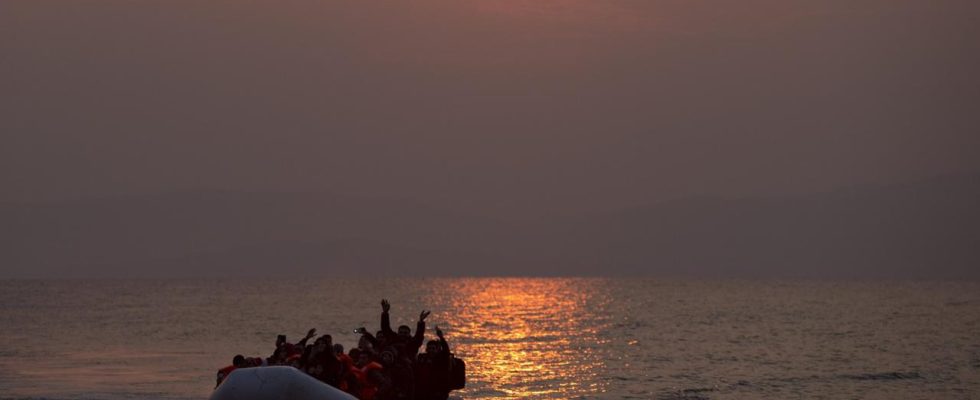There is strong resistance from the traffic light coalition to the demand by CDU politician Spahn to cap the number of refugees. But there is also approval for the call for a turnaround in asylum policy.
Demands from the CDU for stricter restrictions on immigration across the EU’s external borders are met with criticism in the traffic light coalition. Suspending human rights in order to limit migration “cannot be a solution,” Green Party domestic politician Lamya Kaddor told the newspaper “Die Welt”.
Criticism from traffic lights and Left Party
The domestic policy spokesman for the SPD in the Bundestag, Sebastian Hartmann, also opposed the advances. “National isolation and unregulated conditions at the EU’s external borders, as well as quotas, are not an alternative,” he said in the “Welt”.
The left also opposed it sharply. “Anyone who wants to end migration completely accepts that many people will die using brute force,” asylum expert Clara Bünger told the newspaper. Such violence can already be observed at the EU’s external borders in the form of illegal pushbacks.
FDP calls for more EU border protection
However, there are also calls from the traffic light coalition for a tougher course in migration policy: The parliamentary director of the FDP, Stephan Thomae, told the “Welt” that he considered better protection of the EU’s external borders to be necessary “in order to create a Europe of open internal borders to preserve”.
Saxony-Anhalt’s Prime Minister Reiner Haseloff (CDU) warned against overburdening the municipalities in view of the high migration figures. “In the municipalities, the load limit has been reached. Unfortunately, that has not yet fully arrived in Berlin,” he told the “Bild”. “We’re overdoing ourselves with the integration, also with regard to the absolutely necessary integration into the labor market.” Specifically, he also criticized the lack of repatriation of people with no prospects of staying.
Support for the Union’s ideas came from the AfD. Group leader Alice Weidel, however, criticized in the “Welt” that Spahn only spoke of a “pause”, not of an “end of illegal asylum immigration”. What is also necessary is a “reversal” of immigration that has already taken place, demanded Weidel.
Landsberg: Municipalities power limit
The president of the district council, Reinhard Sager, described Spahn’s initiative as essentially correct. “Only the federal government can control and regulate immigration, the capacities of the districts to take in and integrate those seeking protection are more than fully utilized. We are increasingly behind our claim to be able to take in and integrate refugees appropriately,” he told the dpa news agency. The districts need more political momentum here.
The German Association of Towns and Municipalities has been calling for a fresh start in migration policy for a long time, with the aim of ordering and limiting what is happening, says Landsberg.
“Many municipalities have long since reached the limits of their capacity in terms of supply, accommodation and integration. There are not enough housing options, and places in day-care centers and schools for the children must be constantly expanded, which is also made more difficult by a lack of staff and scarce financial resources,” said Landsberg. Funding is the responsibility of the federal and state governments.
Demand for capping migration figures
Spahn had called for a change of course in migration policy at the weekend. “Germany needs a break from this completely uncontrolled asylum migration,” he told the “Bild am Sonntag”.
At the EU’s external borders, there must therefore be a signal: “No one can go any further on this path.” He had advocated taking in and distributing 300,000 to 500,000 refugees a year in Europe. The United Nations refugee agency should choose the people.
Union hopes for “joint solution” with SPD
Former SPD chairman Sigmar Gabriel had also called for a change in migration policy. “We have to combine helpfulness and humanity with clear and enforceable rules for limiting immigration,” he told the editorial network Germany (RND).
Gabriel’s demand met with approval from the CDU/CSU parliamentary group. The First Parliamentary Secretary, Thorsten Frei, told the RND that he hoped for a “common solution like at the beginning of the 1990s”. At that time, the Union and the SPD had agreed on restrictions on the asylum article in the Basic Law. “Our hand is outstretched,” Frei said. “I just hope that Gabriel’s intervention will be heard, especially in his own party.”
Lower Saxony’s Prime Minister Stephan Weil rejected the initiative as unhelpful. More than three quarters of the people who come to Germany enjoy protection rights and cannot be deported at all, the SPD politician told the “Nordwest-Zeitung”. “With the others, there are many people whose identity we cannot clarify or who are not taken back by their countries of origin.”

